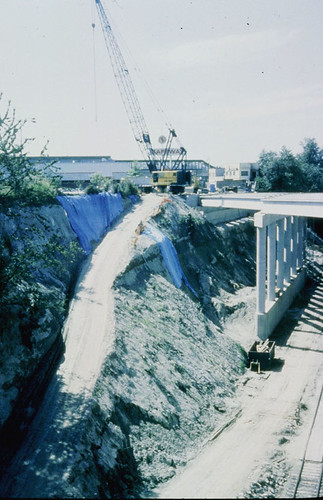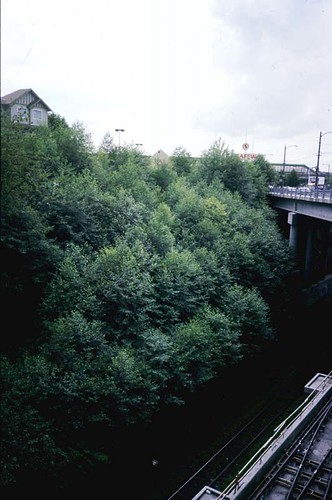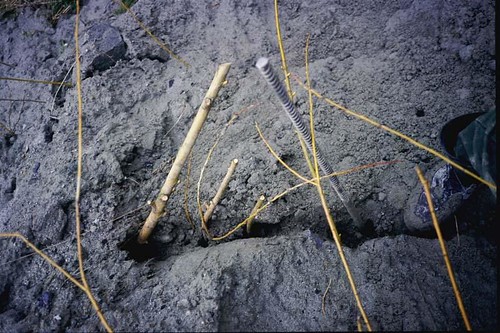
Grandview Cut Construction shared CC by oliverk
I’ve had quite a run of interesting personal/professional development events this past month… Add them to my perpetually-growing “to-be-blogged” queue: a Northern Voice that achieved epic heaviosity, a Sustainable Education Across the Province (SEAP) workshop, and last week in Nelson the always enjoyable spring gathering of the province’s Educational Technology Users Group.

Grandview Cut slope after restoration shared CC by oliverk
Lots of learning, lots of laughs, made some new friends and found new appreciation for old friends. But for now, I abjectly look forward to the next event, which is a week of mornings dedicated to the concept of Open Source City: Field Study:
Site visits and urban walks will form the bulk of this week-long investigation into Vancouver’s built and living environment. Students will tour a number of urban sites where natural systems are beginning to reassert themselves either on their own or with the help of interventionist artists and community activists. We’ll compare and critique different approaches to designing the urban landscape and look at emerging notions of ‘open-source’ landscape and ‘un-planning,’ as well as social sculpture and relational aesthetic. Led by artist Oliver Kellhammer, the course will address the shifting relationships between the built and un-built environments and the surprising processes of regeneration that can bring highly disturbed places back to environmental and social functionality.

cc licensed flickr photo shared by oliverk
The course is led by Oliver Kellhammer, self-described “Canadian land artist, permaculture teacher, activist and writer.” I’ll use that, because he is someone who defies the usual tags. I met him via Laura Trippi at an event on open source technology and learning back in 2002 or 2003… I think we called it “Plonefest”. I’ve been spending a lot of time mulling the connections between my ongoing work in new media with sustainability education, and am hopeful this week will push some good thinking. Some hints to what Oliver might be cooking up can be found in this piece for the Vancouver Observer:
Open source landscape has already happened in the few places where it’s been allowed to evolve. Initially spearheaded by squatters, Vancouver’s thriving community garden scene is now an international showcase for grassroots planning and neighborhood scale sustainability. My own involvement over the past 20 years with the founding of East Van’s Cottonwood Community Gardens and the Means of Production Project have convinced me of the profound potential of community-based land stewardship. These projects thrive because they are adaptive and generative. They constantly evolve as a function of the people who participate in them; every season of human energy and plant growth becomes another layer in a rich palimpsest of place.
And why stop at gardens and parks? Why not ‘open source’ some of our greatest urban challenges – like housing? Some European cities already allow people to construct small, seasonal dwellings next to their community garden plots, making it possible to spend nights sleeping close to nature, right in town. These are real opportunities for community-building, not to mention the reductions in carbon emissions and traffic congestion we might see when people start spending their spare time closer to home.
How many other ‘open-source’ solutions might Vancouverites come up with if they just had more access to vacant land to try out new ideas? The city’s interstitial spaces are ripe with possibility, if only we enforced some by-laws a little less stringently and waited to see what emerged. An open source city needs to reinvent itself continuously. Open source landscapes let people and nature come together in interesting new combinations. Surely we should be encouraging more of that to happen.
The course runs mornings the week of June 20-24… There’s still time to register if this sounds as fascinating to you as it does to me…
* On another plane of thinking about higher education, political economy, sustainability and high-grade doom mongering, Joss Winn continues to amaze. Yet another on the “to-be-blogged” pile.

